Czy korzystasz z funkcji publicize w Jetpack na swojej stronie?
Ostatnio przeglądając Facebooka, znaleźliśmy kilka osób udostępniających linki, w których WordPress zastąpił domenę witryny. Wraz z tym status brzmiał również tak: Michelle Schulp opublikowała artykuł w WordPress.
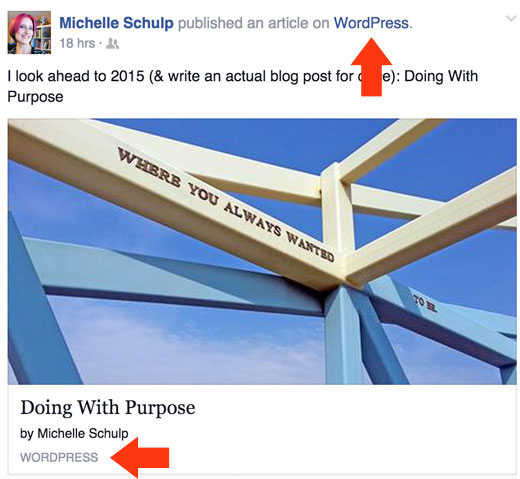
Było to alarmujące, więc postanowiliśmy zbadać problem.
Po kliknięciu w link, przenosi Cię na stronę internetową. Jednak po kliknięciu w WordPress, przenosi Cię na stronę rejestracji WordPress.com na Facebooku.
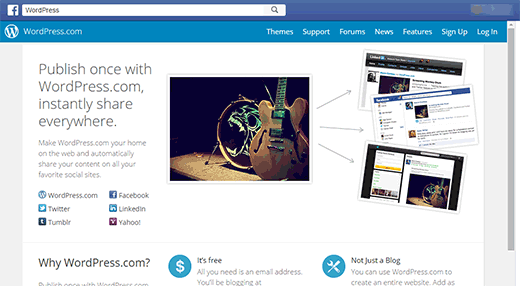
Przyjrzeliśmy się bliżej, aby sprawdzić, czy te strony są hostowane na WordPress.com, usłudze hostingowej blogów. Większość z nich nie była. (zobacz różnicę między darmowym WordPress.com a samodzielnie hostowanym WordPress.org)
Jednak wszystkie miały jedną wspólną cechę. Wszystkie korzystały z wtyczki Jetpack, stworzonej przez firmę macierzystą WordPress.com, Automattic.
Aby zweryfikować nasze ustalenia, postanowiliśmy zainstalować Jetpack na stronie testowej. Powtórzyliśmy problem i jest on związany z funkcją publicize wtyczki.
Podczas konfigurowania funkcji publicize zostaniesz poproszony o połączenie z Facebookiem i udzielenie kilku uprawnień.
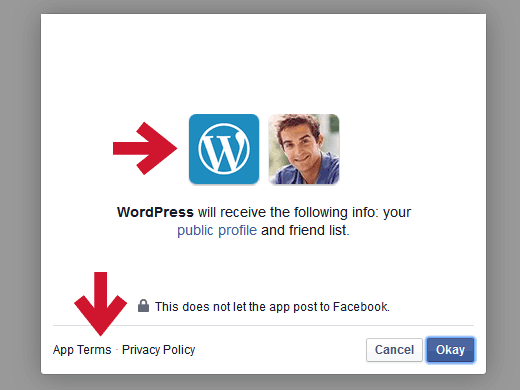
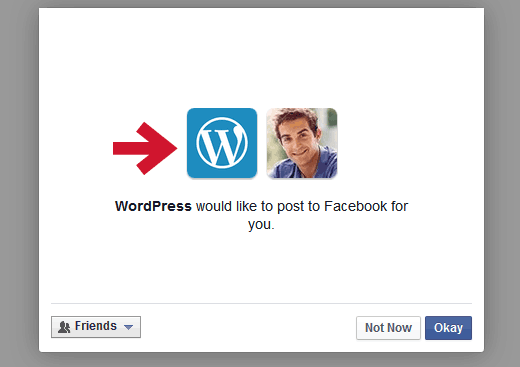
Podczas procesu autoryzacji widzisz niebieskie logo W zamiast szarego logo W. Czym to się różni?
Cóż, jedno jest dla WordPress.com (usługi hostingowej blogów), a drugie dla WordPress.org (oprogramowania, które wszyscy kochamy i używamy).
Mylące, prawda.
Często początkujący nie wiedzą o różnicy, więc myślą, że faktycznie autoryzują swoją witrynę WordPress, a nie platformę zewnętrzną WordPress.com (zobacz relacje i różnice)
Ponadto, sformułowania w całym procesie nie wyjaśniają jasno, że autoryzujesz WordPress.com, a nie swoją faktyczną witrynę. Zobacz poniższy zrzut ekranu potwierdzenia:
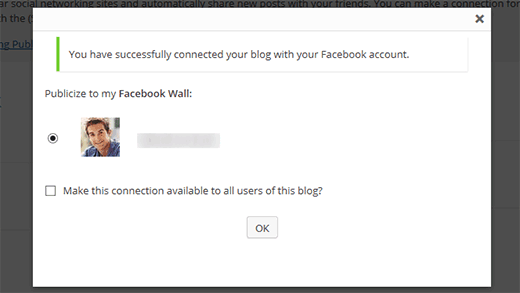
Teraz, jeśli chcesz, aby publicize robił to, co powinien (automatycznie udostępniał Twój post po jego publikacji), oto co zobaczą Twoi użytkownicy.
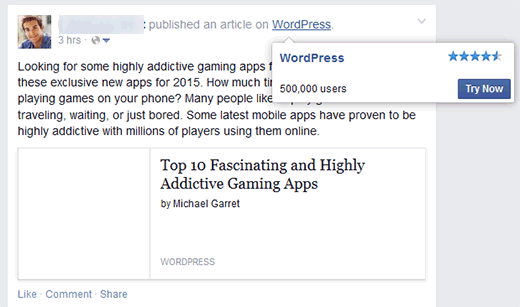
Przeprowadziliśmy dalsze badania i stwierdziliśmy, że nie jest to nowy problem. Został zgłoszony kilkukrotnie od 2013 roku.
Biorąc pod uwagę, że Jetpack jest automatycznie instalowany i aktywowany u kilku głównych dostawców hostingu WordPress domyślnie, należy to poprawić, aby zmniejszyć zamieszanie między WordPress.com a samo-hostowanym WordPress.org.
Chociaż rozumiemy, że Facebook ma swoje ograniczenia, istnieją pewne rzeczy, które można i należy poprawić, aby lepiej informować użytkowników.
Po pierwsze, w danych linku poniżej tytułu posta, zamiast pokazywać WordPress, powinien faktycznie wyświetlać domenę użytkownika, aby promować jego markę. Jak Jeremy z zespołu Jetpack zauważył w komentarzach poniżej, nie jest to możliwe z powodu ograniczeń Facebooka.
Po drugie, sformułowanie mówiące, że Syed Balkhi opublikował artykuł na WordPress, powinno zostać przeformułowane, aby uniknąć nieporozumień.
Jeden z użytkowników, który zgłosił problem, zaproponował zmianę sformułowania: Vikas udostępnił link za pośrednictwem Publicize zamiast mówić, że Vikas opublikował artykuł na WordPressie.
Inną alternatywą mogłoby być: … udostępnił link za pośrednictwem JetPack, ponieważ to właśnie się dzieje.
Na koniec, w oknie dialogowym potwierdzenia powinno być napisane „pomyślnie połączyłeś Jetpack z Facebookiem” lub „pomyślnie połączyłeś swoje konto na Facebooku z Jetpackiem”. [Aktualizacja: Bilet #1476 utworzony przez Jeremy'ego]
Mamy nadzieję, że te sugestie pomogą poprawić doświadczenie użytkowników Jetpack Publicize.
Jetpack to świetna wtyczka dla początkujących, którzy przenoszą się z WordPress.com do WordPress.org, ponieważ pozwala zachować wiele fajnych funkcji WordPress.com, jednocześnie dając moc i swobodę WordPress.org.
Uwaga: Celem tego posta nie jest rozpoczęcie wojny na argumenty, ale zachęcenie do dyskusji i podzielenie się naszą opinią ze społecznością. Darzymy ogromnym szacunkiem i uznaniem Automattic oraz pracę, którą wykonali.
Jeśli podobał Ci się ten artykuł, zasubskrybuj nasz kanał YouTube z samouczkami wideo dotyczącymi WordPressa. Możesz nas również znaleźć na Twitterze i Google+.






Moinuddin Waheed
Używałem wtyczki Jetpack od dawna, od początków (teraz już nie używam) i nigdy nie wiedziałem, że to firma, być może jej spółka matka Automattic, stoi za wordpressDotCom.
Wykonali kawał dobrej roboty dla WordPressa, oczywiście wordpressdotorg i pomogli ogromnej liczbie klientów swoimi świetnymi funkcjami.
Dzięki wpbeginner za poinformowanie nas, jak coś tak ładnie wskazać, nie obrażając ich.
inos
Cześć, eksperci! Jestem Inos. Jestem początkującym użytkownikiem WordPressa. Teraz zaczynam tworzyć mojego osobistego bloga. Zdecydowałem się na osobny hosting dla mojego bloga. Po pewnym doświadczeniu z wordpress.com, jestem bardzo zainteresowany pewnymi dziedzicznymi funkcjami wordpress.com, z których jedną jest możliwość wyświetlania moich postów na blogu w czytnikach WP. Pomyślnie zainstalowałem Jetpack, ale nie widzę żadnych moich postów na blogu w czytniku WP. Jak to zrobić? Dziękuję..
Wsparcie WPBeginner
Cześć Inos,
Jeśli adres URL Twojej witryny zmienił się po przeniesieniu do samodzielnie hostowanej witryny WordPress.org, Twoi użytkownicy będą musieli ponownie obserwować Twoją witrynę. Będą widzieć Twoje posty w czytniku w sekcji Obserwowane witryny.
Admin
Jay
Słowo wordpress jest tam, ponieważ jest to aplikacja WP FB, która jest używana, nie sądzę, że można z tym wiele zrobić. Jeśli ma być zastąpione tytułem bloga lub tytułem strony, to musi istnieć jakiś sposób na dynamiczną zmianę ustawień aplikacji. Wątpię, czy obecnie istnieje taki sposób.
Sacha
To rzeczywiście bardzo podstępne!
Używam Jetpacka ze względu na niektóre jego lepsze funkcje, ale nigdy nie lubiłem Publicize.
WP do Twittera jest lepsze.
Rozz
Nie używaj Jetpack. Używaj poprawnie napisanych wtyczek, takich jak Next Scripts. Są one bardziej niezawodne i konfigurowalne.
Michele Pellegrino
Cześć, ten komentarz jest dla ROZ, chciałem tylko podziękować za polecenie wtyczki NextScript do publikowania mojego bloga na platformach mediów społecznościowych, zamiast JetPack. NextScript miało sens i pozwoliło mi określić, że post trafia na moją stronę Fan, a NIE na moją stronę osobistą, i było bardzo łatwo konfigurowalne. Bardzo doceniam i znacznie lepsza wtyczka!
Justin
Czy polecasz inną wtyczkę niż Jetpack do publikowania postów WP w sieciach społecznościowych?
Używam Jetpacka i tak naprawdę nie mam większych problemów z promocją WordPressa, ale powiedziano mi, że „Jetpack jest szczególnie przeładowanym wtyczką, ponieważ ma wiele wbudowanych funkcji i mini-wtyczek. Kod źródłowy Jetpacka jest nawet większy niż kod WordPressa. Jeśli nie korzystasz z większości jego funkcji, najlepiej będzie go zdezaktywować i usunąć”.
Używam tylko Publicize i ikon społecznościowych na każdym poście na blogu. Z góry dziękuję!
Asif2BD
Przede wszystkim, @SyedBalkhi znowu przeszedłeś na Disqus!
Ostatnio JetPack ciągle wraca do negatywnych rzeczy. To po prostu podsystem pełen funkcji (nie nazwę tego wtyczką), ale prawdopodobnie za dużo w jednym pakiecie.
John Nadeau
Forgive me but now I’m confused I have a WordPress.org site self-hosted at http://LeLacAppelle.com. I use (and love) JetPack to publicize my posts to Facebook Page. I don’t see any reference to WordPress.com in my Facebook Page Posts EXCEPT when I’m logged in as an admin/manager to my Facebook Page. Even then it only says “Posted by Wordpress” in gray and a note upon hovering over the question mark “only people that manage this page can see who posted”. Can you look at my Facebook Page at the first two most-recent posts and tell me if you see any reference to WordPress.com ? https://www.facebook.com/TheLakeIsCalling OH WAIT… I’m posting from my WordPress.org Site > JetPack > to a Facebook “PAGE”. Is that the difference? If I were to post to my own “Personal” Facebook Profile/Page, then would I see the behavior you speak of ?
I have a WordPress.org site self-hosted at http://LeLacAppelle.com. I use (and love) JetPack to publicize my posts to Facebook Page. I don’t see any reference to WordPress.com in my Facebook Page Posts EXCEPT when I’m logged in as an admin/manager to my Facebook Page. Even then it only says “Posted by Wordpress” in gray and a note upon hovering over the question mark “only people that manage this page can see who posted”. Can you look at my Facebook Page at the first two most-recent posts and tell me if you see any reference to WordPress.com ? https://www.facebook.com/TheLakeIsCalling OH WAIT… I’m posting from my WordPress.org Site > JetPack > to a Facebook “PAGE”. Is that the difference? If I were to post to my own “Personal” Facebook Profile/Page, then would I see the behavior you speak of ?
Syed Balkhi
Ja też nie widzę „opublikowano na WordPressie”, więc możliwe, że dotyczy to tylko profili osobistych w porównaniu do stron, gdzie po prostu jest napisane „udostępniono link”.
Jeremy
Tak, Facebook nie oferuje tej samej funkcjonalności dla stron. Niestandardowe historie są wyświetlane tylko na osobistych osiach czasu.
Cameron Archibald
Mam nadzieję, że ten problem Jetpack vs Facebook zostanie rozwiązany. Ale przypuszczam, że najlepszym sposobem udostępniania artykułów lub postów na blogu jest robienie tego ręcznie. Nikt przecież nie lubi maszyn. Słyszałem też, że ręczne publikowanie w porównaniu do automatycznego może być wykrywane przez Google tak samo, jak przez użytkowników, a SEO Juice jest dystrybuowane inaczej.
Khürt L. Williams
„… publikowanie ręczne w porównaniu do automatycznego może zostać wykryte przez Google”. Chciałbym zobaczyć coś, co to potwierdzi. Poważnie, chyba że automatyzacja zawiera jakiś identyfikator, nie jest to możliwe. Ani Google się tym nie przejmuje. Dlaczego miałoby?
takien
Dla mnie nie ma problemu.
ebarney
To nieco poboczne pytanie, ale czy funkcja publicize nie jest „niejawnym udostępnianiem” za pośrednictwem aplikacji, zgodnie z algorytmem Facebooka?
W przypadku stron, którymi zarządzam, zrezygnowaliśmy z publicznego udostępniania przez JetPack treści blogowych po zmianach algorytmu z wiosny ubiegłego roku, które zmniejszają znaczenie niejawnego udostępniania za pośrednictwem aplikacji (http://newsroom.fb.com/news/2014/05/news-feed-fyi-giving-people-more-control-over-when-they-share-from-apps/)
Ręczne kopiowanie linków do artykułów i używanie debuggera linków na Facebooku, aby upewnić się, że działają tak, jak chcemy, daje najlepszy efekt w postaci faktycznego wyświetlania treści: https://developers.facebook.com/tools/debug/
Khürt L. Williams
Link newsroom.fb.com nie działał.
Jak wygląda Twoja lista UL, która powoduje, że renderuje się inaczej po udostępnieniu przez Jetpack w porównaniu do kopiuj-wklej?
ebarney
Chyba zamknąłem moją wcześniejszą odpowiedź bez jej wysłania, przepraszam
Wklej to po podstawowym adresie url newsroom.fb.com i zobacz, czy zadziała: /news/2014/05/news-feed-fyi-giving-people-more-control-over-when-they-share-from-apps/
Udostępnianie za pomocą Jetpack jest mniej widoczne w kanałach informacyjnych czytelników w porównaniu do pobrania dokładnie tego samego adresu URL i ręcznego skopiowania go i wklejenia do pola „udostępnij” na stronie Facebooka, tak właśnie działa zmiana algorytmu fb, o ile dobrze rozumiem.
Nie inny link, tylko inne traktowanie linku w zależności od tego, gdzie/jak jest on wprowadzany do oprogramowania fb.
Mówiąc o algorytmie fb i stronach, istnieje wiele innych obaw dla właścicieli stron dotyczących tego, jak treści, które udostępniasz, NIE SĄ widoczne – nie związane z jetpack, ale problemy z treścią: http://newsroom.fb.com/news/2014/11/news-feed-fyi-reducing-overly-promotional-page-posts-in-news-feed/
Paul Ames
Świetne znalezisko, dzięki, i tak nienawidzę Facebooka za tę część.
Alastair McDermott
Szczerze mówiąc, myślałem, że to po prostu autopromocja ze strony ludzi z WP.com. Ale jak zwykle w takich przypadkach jest inna opcja: używają wspólnej aplikacji, aby ułatwić udostępnianie i nie komplikować sprawy, prosząc o klucze. (Przepraszam za najgorsze założenia, ludzie z Jetpack)
Moim zdaniem powinni dokumentować obecne zachowanie aplikacji, aby być bardziej przejrzystymi w kwestii rzeczy i dawać opcję korzystania z alternatywnej niestandardowej aplikacji. Ale to dodaje znaczną ilość funkcjonalności i zgaduję, że zespół Jetpack jest dość rygorystyczny w kwestii dodawania dodatkowych linii kodu, aby zwalczać potencjalny bloat.
Jeremy
Cześć!
Pracuję dla Automattic i jestem częścią zespołu Jetpack.
Przede wszystkim dziękuję za opinię!
To rzeczywiście może być mylące. Jak wspomniałeś, Facebook ma swoje ograniczenia, co sprawia, że rzeczy stają się skomplikowane lub czasami niemożliwe, gdy chcesz dostosować wynik aktualizacji opublikowanej z aplikacji.
To use your own site name or brand there, you’d have to use your own Facebook app. Since Jetpack aims to help you easily push your content to multiple Social Networks, we won’t ask you to create a Facebook developer account, create an app, change the app settings, and copy app ID and secrets somewhere in your WordPress dashboard. That’d be the opposite of “easy”
Tego nie można zmienić, niezależnie od tego, czy używasz Jetpack, czy innej aplikacji do publikowania na swoim profilu na Facebooku. Sam Facebook tworzy aktualizację i zdanie o udostępnianiu na podstawie ustawień aplikacji i typów obiektów. Więcej o tym można przeczytać tutaj:
https://developers.facebook.com/docs/opengraph/creating-custom-stories/
To faktycznie byłaby opcja. Kiedyś zamiast „WordPress” widniało „WordPress.com”. Zmieniliśmy to na „WordPress”, ponieważ użytkownicy Jetpack uznawali to za mylące.
Rozważaliśmy również inne opcje, w tym „Jetpack”. Niestety, przy obecnej budowie naszego systemu nie jest to możliwe, ponieważ używamy jednej aplikacji dla stron WordPress.com i stron Jetpack.
Nadal jest to w naszych planach! Obecnie pracujemy nad wieloma ulepszeniami modułu Publicize i wkrótce udostępnimy te zmiany w aktualizacji, którą nazwaliśmy „Publicize Next”. Kilka rzeczy, nad którymi pracujemy, można sprawdzić tutaj:
https://github.com/Automattic/jetpack/milestones/Publicize%20Next
Nie jestem pewien, czy rozumiem Twoją sugestię. Czy masz na myśli zastąpienie „Twojego bloga” przez „Jetpack”?
Tak! Zawsze chętnie wprowadzamy zmiany i ulepszenia na podstawie opinii użytkowników.
Jeśli znajdziesz błędy, możesz również skontaktować się z nami bezpośrednio lub zgłosić problem na GitHubie!
Syed Balkhi
Dziękuję za szczegółową odpowiedź, Jeremy. Rozumiem techniczne ograniczenia, dlaczego użytkownik nie może zmienić czasownika „opublikował artykuł na WordPressie”.
Chodzi mi o to, że Wy (zespół Jetpacka) jako twórcy aplikacji możecie dokładnie przedstawić działanie, i cieszę się, że już nad tym pracujecie.
This confusion can be solved if Jetpack uses a separate Publicize app for .org sites rather than using the main WP.com app — this keeps the “easiness” entact for users
Jeśli chodzi o okno dialogowe potwierdzenia, obecnie mówi ono, że Twój blog jest teraz połączony z Facebookiem. Sugeruje to bezpośrednie połączenie, ale zaangażowana jest strona trzecia (obecnie WordPress.com).
Myślę, że jasny komunikat potwierdzający brzmiałby: „Pomyślnie połączyłeś swoje konto na Facebooku z Jetpackiem”.
Byłoby to idealne, jeśli/kiedy pojawi się samodzielna aplikacja dla Jetpack.
Jeszcze raz dziękuję za odpowiedź i z niecierpliwością czekam na nową wersję.
Jeremy
Dodałem Twoją sugestię tutaj i rozważymy ją w przyszłej aktualizacji Jetpack:
https://github.com/Automattic/jetpack/pull/1476
Syed Balkhi
Thanks for your consideration Jeremy
George Stephanis
> This confusion can be solved if Jetpack uses a separate Publicize app for .org sites rather than using the main WP.com app — this keeps the “easiness” entact for users
Ale gdybyśmy to zrobili, jak rozwiązałoby to twoje twierdzenie, że „nadużywamy marek użytkowników” do promowania Jetpacka? To tylko zmiana nazwy z WordPress na Jetpack, co jest jeszcze bardziej związane z naszą marką niż ogólny WordPress.
Syed Balkhi
George, nazwa aplikacji na statusie to naturalne zachowanie na Facebooku, rozumiem to.
Problem, który powoduje zamieszanie, to termin „WordPress”, którego są dwa. Oprogramowanie open-source i firma hostingowa WordPress.com
Również dobór słów w obiekcie akcji Twojej aplikacji pogłębia zamieszanie:
„opublikowano na”
Jeśli akcja mówi opublikowano na WordPress.com (czyż nie byłby to niedokładny opis akcji, ponieważ użytkownik tego nie robi?) — Tak samo jak mówienie opublikowano na WordPress podczas wyświetlania aplikacji wp.com jest również niedokładne.
Sugeruje to, że użytkownik publikuje swój artykuł na WordPress.com, co jest wprowadzającym w błąd stwierdzeniem.
Jeśli dokładnie opiszesz działanie:
XYZ udostępnił link za pośrednictwem Jetpack, więc nikogo nie wprowadzasz w błąd.
wycks
> That’d be the opposite of “easy”
Przy okazji, używam aplikacji innej niż WordPress, która daje użytkownikowi 2 opcje publikowania.
Opcja 1: Łatwe publikowanie, które wykorzystuje wspomniane wyżej ustawienia wtyczki.
Opcja 2: Niestandardowa domena i ustawienia aplikacji, wymaga to około 5 minut pracy i szczerze mówiąc, wystarczy skopiować/wkleić klucze aplikacji i wypełnić co najwyżej 2 pola, a następnie kliknąć zapisz.
Powinniście naprawdę rozważyć danie użytkownikowi obu opcji. Łatwe nie oznacza tego, co myślicie, ani nie służy wszystkim użytkownikom.
Jeremy
To jest coś, co zdecydowanie weźmiemy pod uwagę podczas pracy nad „Publicize Next”, jak wspomniałem powyżej. Gdybyśmy mieli zapewnić taką opcję, prawdopodobnie musielibyśmy ją uprościć, aby uniknąć zaśmiecania pulpitu większą liczbą opcji. Ale możemy sprawdzić, czy możemy zapewnić filtry do tego. Utworzyłem zgłoszenie, aby śledzić ten pomysł tutaj.
Keep in mind that all communication with Facebook is done via WordPress.com, though, so it makes things a bit more complicated for us as we’d have to build a new system to allow you to post from your site to your Facebook app without going through WordPress.com and our app. I’m not saying it’s impossible, but at that point, and since there are already plugins that do that well, it might be best to use one of these plugins instead. You don’t have to use each and every Jetpack module, it’s perfectly fine to deactivate a module and use something else when you need something different
„Łatwo” mogło nie być najlepszym słowem do opisania tego, co miałem na myśli.
Sposób działania Publicize dzisiaj jest z pewnością szybszy w konfiguracji niż gdybyś musiał tworzyć własną aplikację. Jest to rozwiązanie „pod klucz”, podobnie jak większość innych modułów Jetpack.
You could get by by copying and pasting things around and following instructions, but you would also become responsible for your own app, and for keeping up with any changes Facebook may make to the system and the interface later on. It works, but it’s not for everyone.
Khürt L. Williams
Myślę, że „łatwe” w tym kontekście bardziej odnosi się do zrozumienia – łatwe do zrozumienia, czyli „Nie mam pojęcia, czym jest klucz API Facebooka i jak go zdobyć. Daj mi łatwe rozwiązanie”.
Opcja 2 to czysty żargon techniczny. To, co jest łatwe dla Ciebie, jest przeszkodą dla innych.
Jeff Yablon
To jest… niepokojące, ale nie zaskakujące. To też trochę stara wiadomość.
Mówiąc pragmatycznie, mogę bronić WordPressa, w taki sam sposób, w jaki mógłbym bronić Facebooka, gdy wymyślą dla Ciebie adres e-mail, lub Disqus, usługi przetwarzającej te komentarze, gdy przechwytują Twój SEO juice.
Mówiąc nieco bardziej bezwzględnie, mogę powiedzieć coś w stylu: „dają ci coś za darmo, i chociaż prawdopodobnie ujawnili zasady w gęstych warunkach usług, których ani ty, ani nikt inny nigdy nie czyta, ujawnili, ... err ... prawda? Więc pieprz to.”
Ale szczerze mówiąc, obawiam się, że moja reakcja w dużej mierze wraca do kąta „nie dziwi mnie to”. Nie dziwi mnie, że to zrobili, i nie dziwi mnie, że nie zatrzymałeś się i nie zastanowiłeś, że to się stanie.
W swojej istocie właśnie o to chodzi w http://thewordpresshelpers.com. I chociaż wytykanie WordPress/Automattic, et.al. nie jest celem, interesuje nas wytykanie wszystkim wszystkiego; Społeczność WordPress jest prawdopodobnie większa i ważniejsza niż Facebook czy jakikolwiek digi-naród… a wszyscy jej obywatele mają obowiązek działać jako zaangażowani, poinformowani członkowie społeczności.